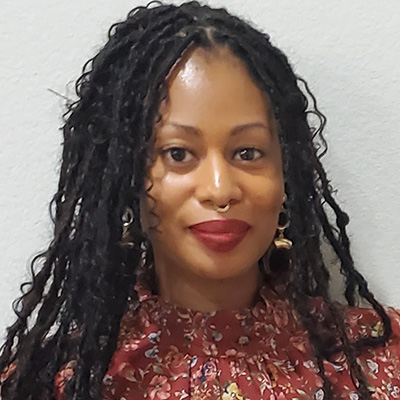School of Public Health
Partnering with High Schools Educators to Build Pathways to Disease Intervention Certification
The University of Memphis School of Public Health aims to sensitize high school students to public health disease intervention and the challenges and solutions needed to address them in the 21st century. We partner with several high schools throughout the Memphis-Shelby County region to facilitate academic program offerings, research collaborations and close gaps in the disease intervention and public health workforce. With the creation of the “Certification in Disease Intervention” (CDI) program, our curriculum will serve as an educational and work-based learning (WBL) pathway pipeline for high schoolers within the 11th and 12th grades. Students will have the opportunity to participate in the dual enrollment program offering college courses with the integration of disease intervention learning modules. At the completion of six courses and other CDI requirements, students will be eligible to take the certification exam to attain a Certification in Disease Intervention.
 Team
Team
Key Personnel

Ashish Joshi, PhD, MBBS, MPH
Dean and Distinguished University Professor
Dr. Joshi is Dean and a Distinguished University Professor of the School of Public
Health of the University of Memphis. Dr. Joshi is an innovator, entrepreneur, educator,
researcher, administrator, and mentor. He is an established population health informatics
researcher who combines his academic training in clinical medicine, public health,
and informatics to design and develop human-centered, technology-enabled interventions
to enhance population health outcomes across diverse community settings. He has extensive
experience in utilizing community and hospital-based data to implement and evaluate
informatics-enabled solutions to address social, economic, and health inequities of
the 21st century. He combines data-driven innovative entrepreneurial creative approaches
to advance excellence in public health education, and research, that can address public
health challenges in the community by preparing the next generation of public health
leaders. Despite his administrative role, continues scholarly and research contributions
toward improving the good health and well-being of individuals, families, and the
communities they live in. Dr. Joshi conceptualized the SMAART informatics model using
combined principles of the human-centered approach, humanistic, behavioral, learning,
and information processing theory to advance the achievement of Sustainable Development
Goals. He has designed and developed, standalone and internet-enabled, multi-lingual,
digital health interventions such as population health dashboards, consumer health
informatics, m-health interventions, and population-based surveillance tools across
multiple settings to improve population health outcomes.
Dr. Joshi successfully completed more than two dozen research projects in the areas
of population health informatics across multiple countries including the US, India,
Nigeria, Bangladesh, Haiti, Egypt, and Brazil. These projects were funded by several
Federal, State, and international government agencies and other private foundations.
Dr. Joshi also launched the first of its kind fully online Certificate and MS Population
Health Informatics Programs. He was awarded by the Open Society Institute to establish
the Regional Population Health Informatics Education Hub to prepare the public health
workforce with skills in population health informatics and how community data can
be utilized to design human-centered interventions for the improvement of population
health outcomes. The hub is established at BRAC James P Grant School of Public Health
with an aim to create a regional network of experts in the population health informatics
field ready to respond as a team to the next public health challenge. Dr. Joshi has
been leading CUNY SPH efforts to implement the NYC Resource Navigator Test and Trace
Program in response to the COVID-19 pandemic and secured an award of a $10 million
contract with the Housing Recovery Operations of the Mayor’s Office to implement the
aftercare resource navigator program to address COVID-19 recovery efforts. Currently,
he is the Chair of the Global Health Informatics Working Group of the American Medical
Informatics Association. He is also an author of the first textbook published on Population
Health Informatics: Driving Evidence-based solutions into practice published by Jones
Bartlett. Dr. Joshi will help establish and co-lead the Center for PH-IDEAS, collaborating
closely with Dr. Michelle Taylor, Director of the SCHD to oversee all components of
this agreement.

Nichole Saulsberry-Scarboro, PhD
Director, PH IDEAS Workforce and Strategic Partnerships
Dr. Nichole Saulsberry-Scarboro is the PH-IDEAS Director of Workforce and Strategic
Partnerships in the School of Public Health at the University of Memphis. She is also
the Program Director for Innovative Non-Profit and Foundations Engaged Research (INFER) in the Department of Research Development at the University of Memphis. Dr. Saulsberry-Scarboro
is a native of Memphis, Tennessee. She is passionate about moving her community forward
and has worked for over 20 years as an administrator successfully developing, implementing
and monitoring projects and initiatives that help people thrive. Specifically, she
has successfully led efforts to assist families dealing with mental illness, increase
university grantsmanship, improve college access and success, increase employment
opportunities for entry-level workers, improve collaboration among human and social
services agencies to more efficiently and effectively assist clients as they move
themselves to economic self-sufficiency, promote education as a civil right and personal
responsibility, create more financially savvy Tennesseans, improve healthy living
habits, and increase exposure to STEM coursework and careers.
In addition to her extensive and varied work experiences, Dr. Saulsberry-Scarboro
is a formally trained educator. She holds a Bachelor of Arts in Education from Emory
University, a Master of Science in Curriculum and Instructional Leadership from the
University of Memphis, and a Doctor of Education in Educational Leadership from the
University of North Carolina at Chapel Hill. Dr. Saulsberry-Scarboro has been happily
married to Dr. Douglas Scarboro for over 23 years and they have two sons, both of
whom, like herself, are elementary school graduates of the University of Memphis Campus
School.

Lori Ward, PhD, MS
Undergraduate Program Coordinator and Associate Professor of Teaching
Dr. Lori Ward earned a dual-title PhD in Pharmacy Administration (Health Outcomes Research) and Gerontology from Purdue University, a Master of Science in Pharmaceutical Sciences (Health Outcomes Research) from Florida A&M University, and a Bachelor of Science in Chemistry from Tennessee State University. Prior to serving as Associate Professor of Teaching and Undergraduate Program Coordinator at the University of Memphis School of Public Health, she held faculty appointments at the University of Mississippi Medical Center Department of Population Health Science, University of Mississippi Department of Pharmacy Administration, and Purdue University School of Pharmacy. Dr. Ward’s research has focused on health disparities and health outcomes with emphases on healthcare access, resource utilization, and medication adherence among vulnerable populations.

Ashley Ross, MPH
Sr. Project Director, Certification in Disease Investigation Program
Ms. Ross is a native Memphian with experience in both chronic and infectious disease public health. She has spent the last few years working in leadership in the prevention and treatment of HIV among adolescent youth, creating an opioid program to provide wrap-around services for tribal members. And most recently, She is working to strategically help implement a high school pathway program for students to obtain a certificate for disease intervention specialist to close DIS workforce gaps. Ms. Ross is always looking for exciting new ways to decrease disease burden and improve quality of life for the communities she serves. Ms. Ross believe by serving in a public health role that we can stop the spread of communicable diseases increasing longevity of life by reaching one person at a time.
Graduate Assistants

Amaree Austin
Graduate Research Assistant
Amareé Austin is a 2nd year graduate student pursing her Master of Public Health and Master of Applied Anthropology. An alum of Rhodes College, Amaree put her undergraduate Anthropological training to use through collaborative and engaged community work with local nonprofit organizations with a focus on economic justice and community participatory action research. For the past 4 years, Amaree has both supported and led qualitative research projects supporting both Black low-income youth workers in Memphis and Black mothers seeking health reproductive care. Committed to connecting engaged work with academic workforce development, she currently contributes to the DIS project as a Public Health Graduate Assistant.

Esthela Rios
Graduate Research Assistant
Esthela is a 2nd year Master of Public Health student and also works at Latino Memphis where she serves as the Director of Tu Salud and the Assistant Director of Senderos- programs that work to improve health outcomes and economic mobility respectively. She is a first-generation Mexican-American and she completed her undergraduate career at the University of Tennessee-Knoxville. Esthela is eager to contribute her professional, academic, and lived-experiences to the DIS project as a Public Health Graduate Assistant.
 The content is relative to the six domains of disease intervention as follows:
The content is relative to the six domains of disease intervention as follows:
- Collaboration
- Surveillance and Data Collection
- Planning and Case Analysis
- Field Services and Outreach Activities
- Interviewing and Case management Activities
- Outbreak Response and Emergency Preparedness
 Activity 1
Activity 1
Scan of Current Disease Intervention-Related High School Education Programs
Program Scan and Analysis
• Scan of existing HS DI programs
• Comparison of job tasks and competencies within DI
• Identify DI workforce demand for HS graduates
• Identify sustainable funding options for a HS pathway
• Identify possible HS student support needs to facilitate recruitment and retention
Listening Sessions
• Conduct listening sessions with HS career services, guidance counselors, CCTE leaders,
HS students, and other pertinent stakeholders (virtual and/or in-person) to determine
desire for and feasibility of a HS educational pathway for DI professionals
• Listening session recruitment
• Develop listening session guide(s)
• IRB approval
 Activity 2
Activity 2
Feasibility of Establishing a High School Educational Pathway for the Disease Intervention Workforce
External Partnership Strategies
• Generate a list of potential community-based partners for HS student recruitment,
including recruitment strategies (e.g. virtual info sessions, recruitment fairs, etc.).
Special focus should include minority-serving institutions.
• Generate a list of potential community-based partners for WBL opportunities for
HS students, including recruitment strategies (e.g. virtual info sessions, professional
associations, community meetings, etc.)
Curriculum Integration and Development
• Identify necessary topics/learning experiences for HS DI programs in alignment with
CDI exam domains
• Align University of Memphis public health dual-enrollment curriculum with CDI exam
domains and eligibility criteria as an example for other institutions
• Identify gaps in curriculum alignment to support preparation of DI workforce with
recommendations for strategies to fill gaps
• Identify strategies to ensure DI-related WBL opportunities for HS students to support
CDI exam eligibility
• Develop template for student enrollment data collection (e.g. Qualtrics survey)
Deliverable
A report with final recommendations for building a high school educational pathway to the DI workforce. Includes a program scan and analysis, findings from listening sessions, recommendations for building external partnerships, and curriculum recommendations.
Certified in Disease Intervention - NBPHE
https://ncsddc.org/our-work/about-disease-intervention/
Disease Intervention | STI | CDC
